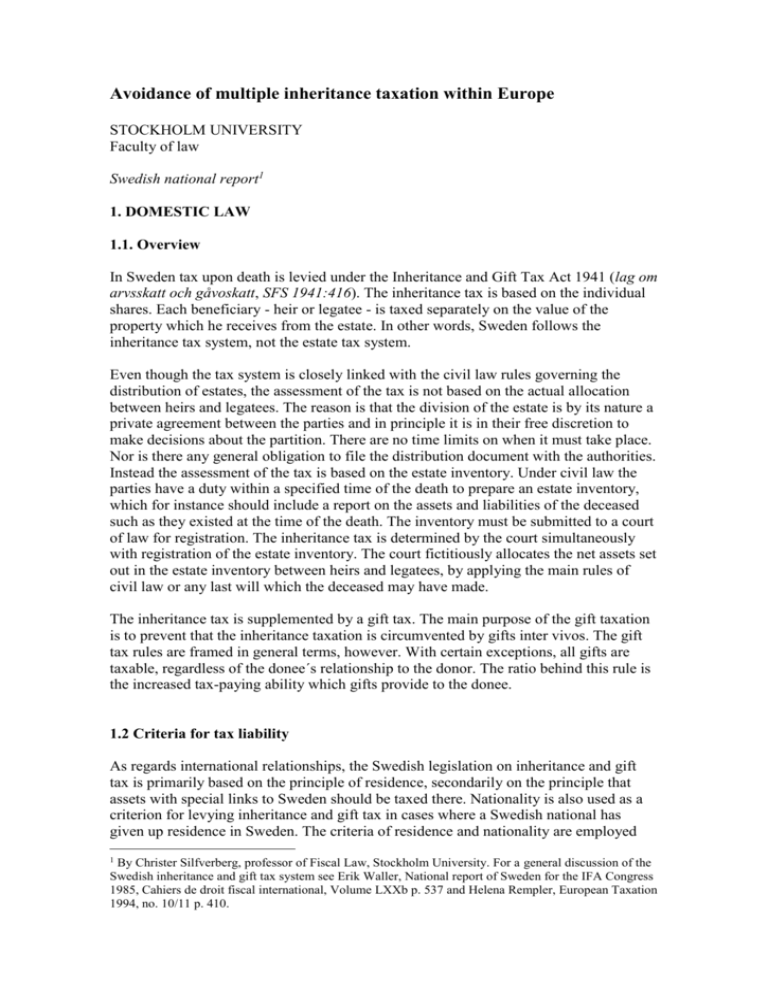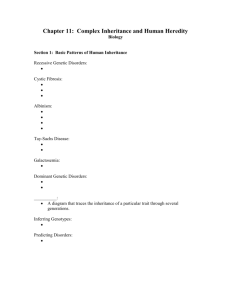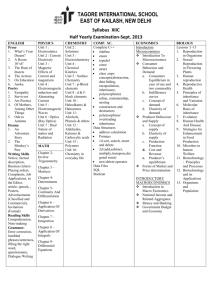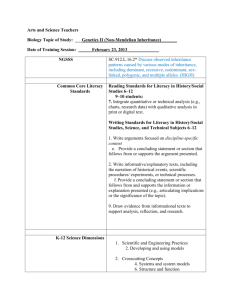Sweden - European Association of Tax Law Professors
advertisement

Avoidance of multiple inheritance taxation within Europe STOCKHOLM UNIVERSITY Faculty of law Swedish national report1 1. DOMESTIC LAW 1.1. Overview In Sweden tax upon death is levied under the Inheritance and Gift Tax Act 1941 (lag om arvsskatt och gåvoskatt, SFS 1941:416). The inheritance tax is based on the individual shares. Each beneficiary - heir or legatee - is taxed separately on the value of the property which he receives from the estate. In other words, Sweden follows the inheritance tax system, not the estate tax system. Even though the tax system is closely linked with the civil law rules governing the distribution of estates, the assessment of the tax is not based on the actual allocation between heirs and legatees. The reason is that the division of the estate is by its nature a private agreement between the parties and in principle it is in their free discretion to make decisions about the partition. There are no time limits on when it must take place. Nor is there any general obligation to file the distribution document with the authorities. Instead the assessment of the tax is based on the estate inventory. Under civil law the parties have a duty within a specified time of the death to prepare an estate inventory, which for instance should include a report on the assets and liabilities of the deceased such as they existed at the time of the death. The inventory must be submitted to a court of law for registration. The inheritance tax is determined by the court simultaneously with registration of the estate inventory. The court fictitiously allocates the net assets set out in the estate inventory between heirs and legatees, by applying the main rules of civil law or any last will which the deceased may have made. The inheritance tax is supplemented by a gift tax. The main purpose of the gift taxation is to prevent that the inheritance taxation is circumvented by gifts inter vivos. The gift tax rules are framed in general terms, however. With certain exceptions, all gifts are taxable, regardless of the donee´s relationship to the donor. The ratio behind this rule is the increased tax-paying ability which gifts provide to the donee. 1.2 Criteria for tax liability As regards international relationships, the Swedish legislation on inheritance and gift tax is primarily based on the principle of residence, secondarily on the principle that assets with special links to Sweden should be taxed there. Nationality is also used as a criterion for levying inheritance and gift tax in cases where a Swedish national has given up residence in Sweden. The criteria of residence and nationality are employed 1 By Christer Silfverberg, professor of Fiscal Law, Stockholm University. For a general discussion of the Swedish inheritance and gift tax system see Erik Waller, National report of Sweden for the IFA Congress 1985, Cahiers de droit fiscal international, Volume LXXb p. 537 and Helena Rempler, European Taxation 1994, no. 10/11 p. 410. with regard to the deceased/donor even though it is the heir/donee who is liable to pay the tax. Inheritance tax is imposed on the value of all property, wherever it is situated (unlimited tax liability), if the deceased/donor was a resident of Sweden at the time of death/gift or if the deceased/donor was a Swedish national or a person married to a Swedish national who had resided in Sweden within ten years prior to the time of death/gift. The concept of residence is not defined in the Inheritance and Gift Tax Act. In considering whether the deceased/donor was resident in Sweden or not, special account is taken to the holding of a permanent home. But also individuals who have their habitual abode in Sweden are considered resident in Sweden for inheritance tax purposes. In addition inheritance tax is levied where the deceased/doner is not a resident of Sweden on inheritance and gift of following types of property (limited tax liability): 1. real property situated in Sweden; 2. moveable property situated in Sweden and belonging to a business pursued by the deceased/donor in Sweden; 3. the usufruct of property set out under 2. as well as the right to royalties for such property and participations in Swedish tenant-owner associations or companies with main purpose to provide housing for the shareholders; and 4. shares in Swedish companies and partcipations in Swedish economic associations, cooperative societies, partnerships, mutual funds and shipping companies. Inheritance of property under this category is subject to Swedish inheritance tax only if the deceased was a Swedish national. A gift of any property mentioned under this category is taxable if the donor or the donee is a Swedish national or if the donee is a Swedish legal entity. 1.3. Tax avoidance The general anti-avoidance rule that is included in the Tax Avoidance Law, is not applicable on transactions concerning the inheritance and gift tax. However, the Inheritance and Gift Tax Act does contain some provisions that aim at preventing tax avoidance. One example is the cumulation rule imposed to prevent that the progressivity of the tax is circumvented by splitting transfers into several transactions. In assessing the tax on one acquisition earlier acquisitions from the same person are taken into account. Under the main rule, the time limit within which the different acquisitions must have taken place is ten years. Another rule that could be mentioned in this context stipulates unlimited tax liability for Swedish nationals for a period of ten years after giving up residence in Sweden (see under 1.2.) A third example is the special restrictions for using a favourable valuation method when small businesses are transferred by gift (se under 1.4.) Such gifts must not involve conditions to the benefit of the donors or others. In addition, the gifts must comprise the entire right to the property, and the donee must retain ownership of an essential part of the property for at least five years. 1.4 Valuation and exclusions The basic principle for valuation applied in the Inheritance and Gift Tax Act is that the property shall be valued at the market price. For certain types of assets special rules apply which in many cases lead to significant reductions in relation to the market value. The most significant exceptions from the market price rule are: - real property is taxed at its assessed value, which should reflect 75 % of the market price; - shares listed on the Swedish or foreign Stock Exchange are valued at 75 % of the quoted value; - shares which are not listed on the Stock Exchange but marketed on another open market, for instance the over-the-counter market, are valued at 30 % of the market price. - property which has formed part of a business pursued by the deceased/donor directly or indirectly through a closely-held company, is valued at 30 % of its net value. There are no rules excluding certain goods from taxation, except that in individual cases Government may wholly or partly exempt historical, scientific or artistic collections from tax. 1.5. Rates and tax-free base amounts The rates of the Swedish Inheritance and Gift Tax Act are progressive and vary both with the value of the property received and with the legatee's relationship to the decedent. Beneficiaries are divided into three classes, with a special rate table applicable to each class. Class I comprises the spouse and children of the deceased. Class III comprises different associations of a public nature and Class II all beneficiaries who do not belong in Class I or Class III. For the most favoured class, Class I, there is a taxfree allowance of SEK 280.000 for the surviving spouse and SEK 70.000 for each child. In addition, a child is entitled to an additional allowance if he has not yet reached the age of 18 years. Beneficiaries under Class II and III are entitled to a taxfree allowance amount of SEK 21.000. Bequests and gifts to foundations and other associations are entirely exempt from inheritance and gift tax if the organisations are promoting objectives for the public benefit, such as scientific research or the care of elderly, sick or disabled people. The tax rate schedule of Class I is as follows: Taxable amount, SEK Inheritance tax, SEK 0-300.000 300.000-600.000 600.000- 10 % 30.000 + 20 % within the range 90.000 + 30 % within the range The highest tax rate in Class II and III is also 30 %, the difference being that the rate is effective at a lower taxable amount. The gift tax is subject to the same schedule as inheritance tax. The taxfree base amount is SEK 10.000 per year for all categories of donees. It should be noted that beneficiaries under Class III are exempt from gift tax. According to Swedish marital law, the spouses normally have a right on dissolution of marriage to receive half the value of the other spouse´s property. What a spouse receives on death of the other spouse as a consequence of this rule is not inheritance but an acquisition by marital law. Thus, the acquisition is not subject to inheritance tax. Example: A man dies. His spouse and their two children are the sole heirs to the estate. The spouses´ aggregate wealth has a value of SEK 2.000.000. One half of the aggregate wealth is exempt from tax. The other half is inherited by the surviving spouse. Joint children of spouses are not entitled to inherit until both parents are dead. The spouse is allowed to the taxfree allowance of SEK 280.000. Thus, the taxable share is SEK 720.000 and the tax is calculated to SEK 126.000. The tax will often be reduced by way of the surviving spouse yielding all or part of her right to her children. 1.6. Striking features The most striking feature seems to be the rather high tax on average acquisitions in combination with an inconsistent system for the valuation of property. Despite the rather substantial reduction of the tax rates, enacted in 1982, the taxes are still high on transfers of rather small amounts to close relatives. The highest tax bracket (30 %) in Class I (spouse and children), applies already when the taxable amount exceeds SEK 600.000. The high taxes have caused some undesirable effects in practice. In order to reduce these effects, special rules have been introduced for the valuation of property. The result has been that almost all valuable types of property are subject to different reductions in relation to the market value. Another feature distinguishing the system from those of most other European countries seems to be that gifts between spouses are taxed with no relief, apart from the general basic allowance of SEK 10.000 per year. There are ways around this, however, for spouses changing between the marital property law regimes. 2. DOUBLE TAXATION RELIEF 2.1. Unilateral relief According to a provision under the Inheritance and Gift Tax Act, taxpayers can apply for a reduction or waiver of the tax in cases of actual double taxation. Decisions on these matters are made by the Government or a Government Agency on discretionary grounds. There is thus no absolute right for the taxpayers to have the double taxation effect removed. In practice a form of mutuality is required. If the other state is ready to allow a reduction or waiver in a corresponding situation Sweden will, too, otherwise not. 2.2. Tax treaties - Overview Sweden has concluded tax treaties with several nations for the avoidance of double taxation of inheritance. The treaties currently in force are set out in the following table: Nation Date of conclusion Scope Hungary The Netherlands Belgium Italy South Africa Israel Austria Spain Switzerland United Kingdom U.S.A. Denmark, Finland, Iceland and Norway Germany 20/11/1936 25/4/1952 18/1/1956 20/12/ 1956 29/5/1961 15/5/1962 21/11/1962 25/4/1963 7/2/1979 8/10/1980 13/6/1983 12/9/1989 France 8/6/1994 Inheritance Inheritance Inheritance Inheritance Inheritance Inheritance Inheritance Inheritance Inheritance Inheritance and gift Inheritance and gift Inheritance and gift (multilateral treaty) Inheritance and gift (comprehensive treaty) Inheritance and gift 14/7/1992 Even though most of the treaties are older than the OECD Model Convention the provisions of the treaties in general are along the lines of the Convention. However, some deviations can be noticed. As far as inheritance tax is concerned the scope of the Model Convention is limited to the estates of individuals domiciled in one or both Contracting States. Some of the treaties use other criteria in this respect. For instance the applicability of some older treaties depends on the fact that the deceased on his death was a national of one of the Contracting States (treaties with Belgium, Hungary, Italy and the Netherlands). The treaty with Austria applies to inheritances of nationals or persons domiciled in one of the Contracting states. A wider scope is used in the treaty with United Kingdom, since this treaty is applicable to any person who is within the scope of a tax which is covered by the treaty. Some deviations from the Model Convention are due to the principles used by the Contracting State on determining its worldwide taxation base. For instance, the treaty with U.S.A. gives a contracting state the right to impose tax on its citizens, irrespective of the domicile at the time of death or gift, and the treaty with Germany extends the right to impose tax to the State where the heir or the donee is domiciled. However, in both these cases a secondary right to tax is provided for, which means that the State in question is obliged to give a credit for tax levied in the other Contracting State. The treaty provisions allocating the taxing rights between the Contacting States are likewise to a large extent similar to the Model Convention. However, deviations concerning certain types of property occur in individual treaties. Moveable property, for instance, is in some cases taxed on the base of situs. One example is "biens mobiliers corporels" in the treaty with France. Another example refers to tangible assets in the treaty with Spain. Under the latter treaty, shares in a company are also allocated to the situs State, but only if the deceased was a domiciliary of the same State, otherwise the shares are to be taxed in the State, in which the company is registered. Another special article stipulates that ships and aircraft operating in international traffic may be taxed in the Contracting State in which the place of the effective management of the enterprise is situated (treaties with Switzerland, United Kingdom and France). Some deviations from the OECD Model Convention depend on the internal legislation in each state. One example is the right, according to the rule mentioned under sec. 1.5. above, for the surviving spouse to exempt one half of the aggregate wealth of the spouses from inheritance taxation. This rule is applicable under the treaties with United Kingdom and U.S.A. even if the marital law preconditions do not exist. 2.3. OECD Model-conform? As indicated above, all the Swedish treaties are either formulated in accordance with the OECD Model Convention or, as far as the older treaties are concerned, in general along the lines of the Convention. 2.4. Method to avoid double taxation The treaties of later years (the treaties with United Kingdom, U.S.A., Germany, France and the Nordic Multilateral Convention) are all based on the credit method. The treaties with Spain and Switzerland provide for ordinary credit in some cases and exemption with progression in other cases. All the other, older, treaties are based on the exempt principle. The treaties with Belgium and the Netherlands entitle Sweden the right to apply the exemption with full progression method. The Swedish tax on the remaining property is levied at the highest rate which would be applicable if the entire property had been subject to Swedish tax. The other treaties apply the exemption with progression method. On the basis of this method Swedish tax is levied at the average rate, which would be used if the entire property had been subject to Swedish tax. 3. EC LAW First, it should be noticed that the impact of the EC Treaty on the provisions of the Inheritance and Gift Tax Act has not been tested in case law. However, some of the provisions may be an obstacle to the principle of free movement within the EU. Sweden levies inheritance tax or gift tax on a worldwide base during a period of ten years after a Swedish national, or a person married to a Swedish national, has given up residence in Sweden. Since the development of EC Law has probably not yet reached the point where it is forbidden for a Member State to discriminate against its own citizens, the disputed rule seems to be acceptable as far as the Swedish nationals are concerned. However, with respect to the spouse of a Swedish national it is more likely that discrimination is found to take place if the person is a citizen of an EC Member State. Furthermore, it may be discriminating that shares, which are listed on over-the-countermarket or some other open market within Sweden are valued at 30 % of the quoted value, while shares listed on corresponding foreign Stock Exchanges are valued at 75 % of the quoted value. According to a special rule, designed primarily for family business, property which has formed part of such a business is valued at 30 % of its net value. In practice this rule has been deemed not to be applicable on stocks in companies registered abroad. If the company is located within EC the application of the rule seems to be an clear case of discrimination. 4. CASE According to domestic law Sweden will impose tax on the worldwide base if Sweden is in the position of country A, B or C. If Sweden is in the position of country D tax is levied only on the situs property. If the person deceases during a holiday in Sweden no taxes will be imposed. Of course a tax treaty could provide for avoidance of double taxation but the preconditions depends on which other countries are involved in the case.






![[11.1,11.2,11.3] COMPLEX INHERITANCE and HUMAN HEREDITY](http://s3.studylib.net/store/data/006715925_1-acaa49140d3a16b1dba9cf6c1a80e789-300x300.png)